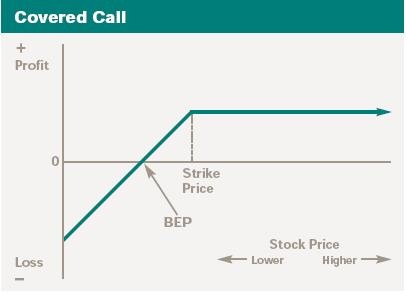What is Covered Call Writing?
The covered call is a strategy in which an investor writes a call option contract while at the same time owning an equivalent number of shares of the underlying stock. If this stock is purchased simultaneously with writing the call contract, the strategy is commonly referred to as a "buy-write." In either case, the stock is generally held in the same brokerage account from which the investor writes the call, and fully collateralizes, or "covers," the obligation conveyed by writing a call option contract.This strategy is the most basic and most widely used strategy combining the flexibility of listed options with stock ownership.
Market Opinion?
Neutral to moderately bullish on the underlying stock
When to Use?
Though the covered call can be utilized in any market condition, it is most often employed when the investor, while bullish on the underlying stock, feels that its market value will experience little range over the lifetime of the call contract. The investor desires to either generate additional income (over dividends) from shares of the underlying stock, and/or provide a limited amount of protection against
a decline in underlying stock value.
Benefit?
While this strategy can offer limited protection from a decline in price of the underlying stock and limited profit participation with an increase in stock price, it generates income because the investor keeps the premium received from writing the call. At the same time, the investor can appreciate all benefits of underlying stock ownership, such as dividends and voting rights, unless he is assigned an exercise notice on the written call and is obligated to sell his shares.There is a significant chance that an option whose underlying stock is paying a dividend may be exercised prior to expiration.
Risk vs. Reward?
Maximum profit will occur if the price of the underlying stock you own is at or above the call option’s strike price, either at its expiration or when you might be assigned an exercise notice on the call before it expires.The risk of real financial loss with this strategy comes from the shares of stock held by the investor.This loss can become substantial if the stock price continues to decline in price as the written call expires. At the call’s expiration, loss can be calculated as the original purchase price of the stock less its current market price, less the premium received from initial sale of the call. Any loss accrued from a decline in stock price is offset by the premium you received from the initial sale of the call option. As long as the underlying shares of stock are not sold, this would be an unrealized loss. Assignment on a written call is always possible.
Break-Even Point (BEP) at Expiration?
BEP: Stock Purchase Price – Premium Received
Volatility?
If Volatility Increases: Negative Effect
If Volatility Decreases: Positive Effect
Time Decay?
Passage of Time: Positive Effect
With the passage of time, the time value portion of the option’s premium generally decreases – a positive effect for an investor with a short option position.
Alternatives before expiration?
If the investor’s opinion on the underlying stock changes significantly before the written call expires, whether more bullish or more bearish, the investor can make a closing purchase transaction of the call in the marketplace.This would close out the written call contract, relieving the investor of an obligation to sell his stock at the call’s strike price. Before taking this action, the investor should weigh any realized profit or loss from the written call’s purchase against any unrealized profit or loss from holding shares of the underlying stock. If the written call position is closed out in this manner, the investor can decide whether to make another option transaction to either generate income from and/or protect his shares, to hold the stock unprotected with options, or to sell the shares.
Alternatives at expiration?
As expiration day for the call option nears, the investor considers three scenarios and then accordingly makes a decision.The written call contract will either be in-the money, at-the-money or out-of-the-money. If the investor feels the call will expire in-the-money, he can choose to be assigned an exercise notice on the written contract and sell an equivalent number of shares at the call’s strike price.
Alternatively, the investor can choose to close out the written call with a closing purchase transaction, canceling his obligation to sell stock at the call’s strike price, and retain ownership of the underlying shares. Before taking this action, the investor should weigh any realized profit or loss from the written call’s purchase against any unrealized profit or loss from holding shares of the underlying stock. If the
investor feels the written call will expire out-of-the-money, no action is necessary. He can let the call option expire with no value and retain the entire premium received from its initial sale. If the written call expires exactly at-the-money, the investor should realize that assignment of an exercise notice on such a contract is possible, but should not be assumed. Consult with your brokerage firm or a financial advisor on the advisability of what action to take in this case.






No comments:
Post a Comment